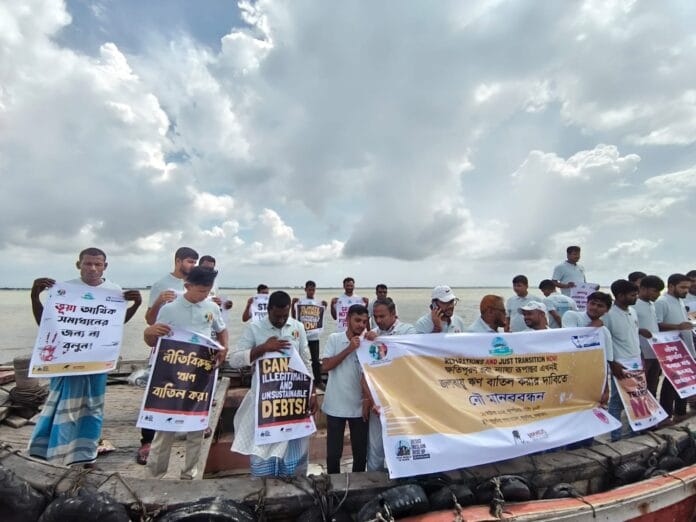Civil society groups across Bangladesh staged nationwide protests this week demanding debt cancellation, fair compensation, and climate justice, in solidarity with the global campaign week titled “Stop the Harm! Cancel the Debt! Reparations and Just Transitions Now!”
The initiative, led by Dhritri Rokkhay Amra (Dhara), coincided with the annual meetings of the International Monetary Fund (IMF) and the World Bank. Activists from civil society, youth organizations, and environmental movements joined forces to call for freedom from the burden of debt, climate justice, and the establishment of a fair global economic system.
The global week of action, observed from October 13 to 18, brought together more than 50 organizations across Asia, Africa, and Latin America. Participants collectively demanded compensation, not loans, urging wealthy nations to acknowledge their historical responsibility for the climate crisis and to ensure grant-based climate finance.
In Bangladesh, solidarity events were held nationwide, including a public rally in Mongla, human chains in Barguna, Kalapara, and Patharghata, a boat human chain in Kutubdia, a march in Taltoli, a bicycle rally in Sylhet, and a symbolic boat rally in Habiganj.
Speakers at the events said so-called development projects are being used to impose debt, trapping the economies and societies of the Global South. They warned that austerity measures and private sector–driven growth models disproportionately harm women, workers, and marginalized communities.
They urged democratic reform of international financial institutions and called for the creation of a UN Framework Convention on Debt Management to ensure fairness and accountability.
Lidy Nacpil, Coordinator of the Asian Peoples’ Movement on Debt and Development (APMDD), said:
“The IMF and World Bank act as instruments of the G7 nations, serving the interests of the wealthy while deepening the debt and climate crises. It’s time to stop pretending that more loans can solve these problems.
Rich countries are avoiding responsibility for the climate catastrophe they created, imposing new conditions—privatization, trade liberalization, and neoliberal reforms—that violate human rights and secure profits for corporate elites. This must end, and we must move toward a truly just economic transition.”
Sharif Jamil, Coordinator of Waterkeepers Bangladesh, added: “Multilateral development banks and the Global North continue to push loans as solutions to the climate crisis—a crisis the Global South did not create. This only tightens the noose around communities already struggling under illegitimate debts and worsening climate disasters.
We cannot expect bold, transformative action from institutions owned and controlled by the world’s richest nations, which still refuse to meet their historic responsibility for adequate, grant-based climate finance.”
As part of the 2025 global movement “Our World Is Ours: Resist, Recover, Rise for System Change,” organizers expressed hope that the week-long actions would strengthen the global justice movement ahead of the upcoming COP30 Climate Conference and G20 Summit.

